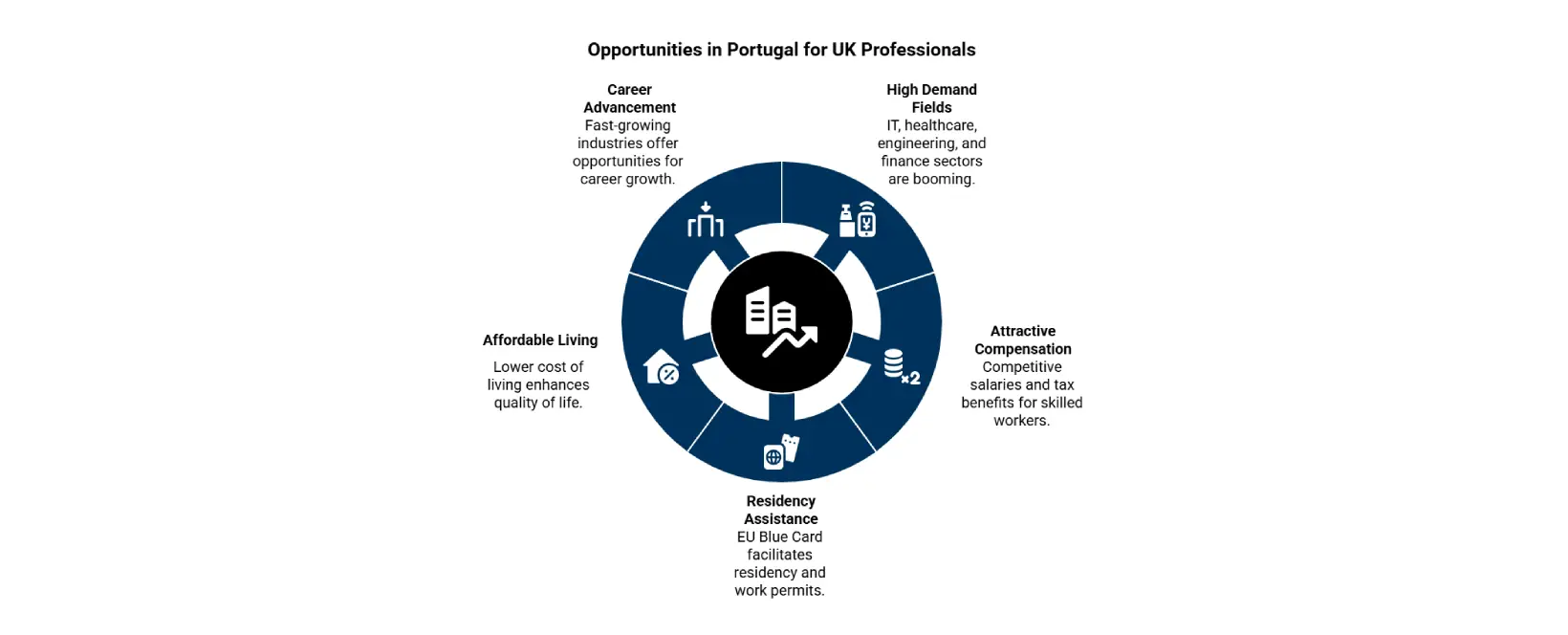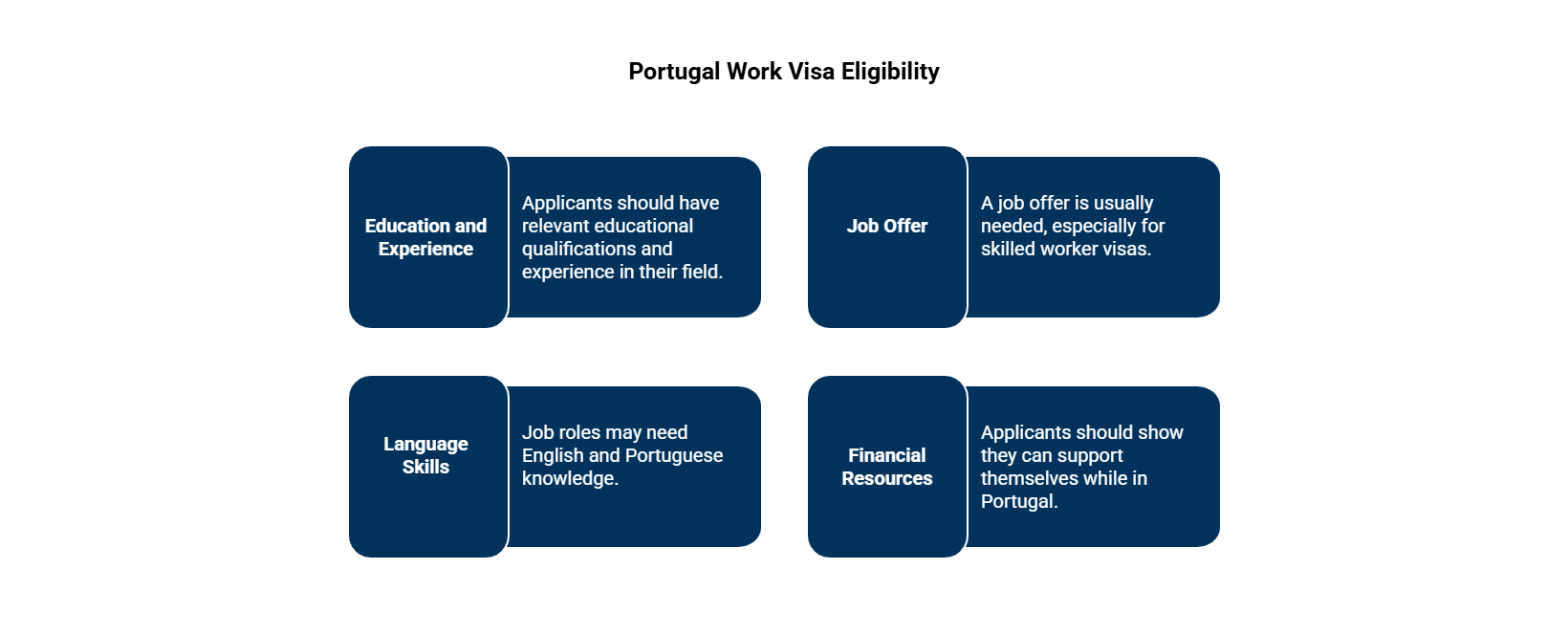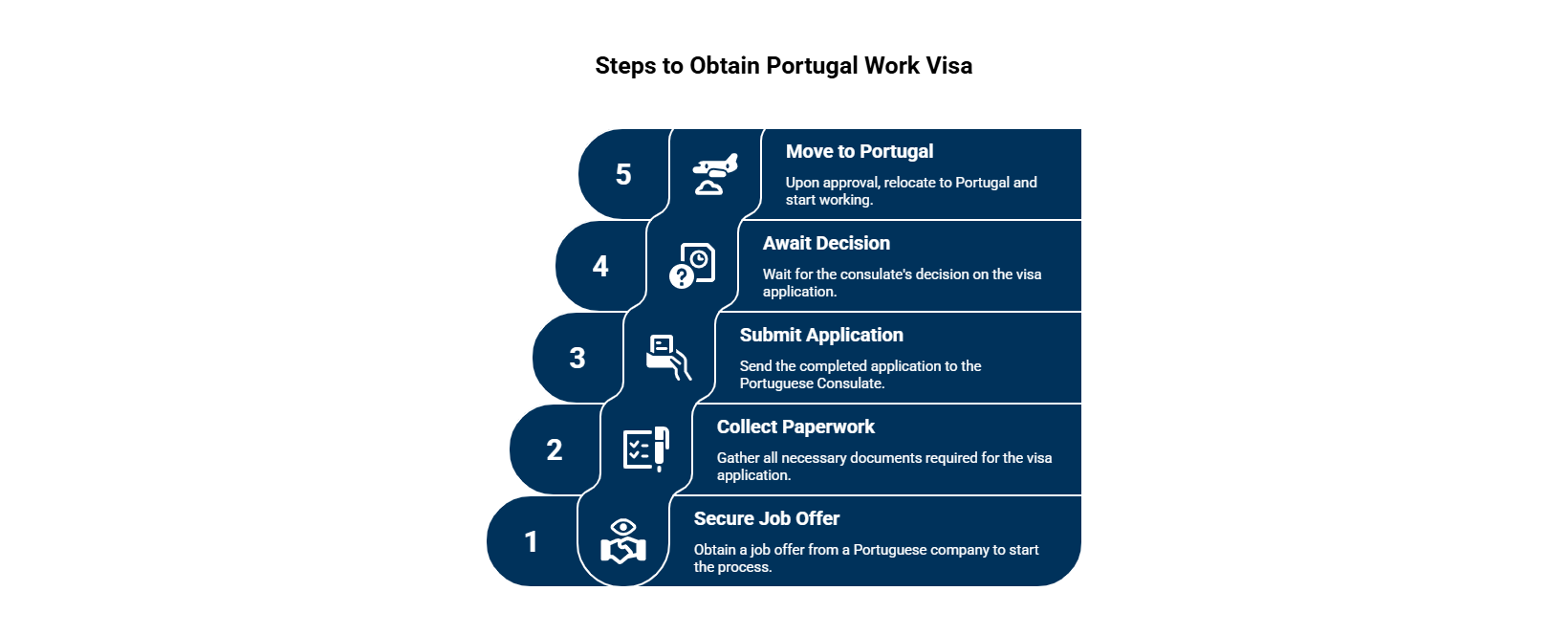Top In-Demand Occupations in Portugal for UK Professionals
The job market in Portugal is changing, presenting good career options for UK experts in fields like healthcare, IT, engineering, and finance. The country's economy is getting bigger and focusing on digital changes. This is bringing skilled workers to Portugal. Good salaries, a nice life, and a good balance between work and life make Portugal a great place for experts looking for new jobs.
- There is a greater need for people in IT, healthcare, engineering, and finance.
- Salaries are good, and there are tax breaks for skilled workers.
- The EU Blue Card helps with residency and work.
- The living is good, and it doesn't cost too much to live there.
- Fast-growing job areas mean chances to move up in your career.

*Want assistance to apply for work overseas? Y-Axis is here to assist you with the process.
Why Work in Portugal?
Portugal attracts professionals from the UK because it mixes a strong job market with a great quality of life. The nation has a steady economy, a talented workforce, and focuses on areas such as tech and engineering. Its affordable living costs, good weather, and work-life balance make it attractive to those moving abroad. Besides, Portugal provides tax advantages to skilled workers, along with a simple way to get work permits.
- Pleasant weather and pretty scenery.
- Lower living costs than many EU countries.
- Jobs are available in IT, engineering, and healthcare.
- Access to EU advantages and social security.
- Good healthcare, schools, and infrastructure.
Top In-Demand Occupations in Portugal
Portugal’s labor market continues to face critical skill shortages across multiple sectors. According to EURES, CEDEFOP, and IEFP, these shortages are especially prominent in healthcare, ICT, skilled trades, tourism, and logistics—presenting opportunities for international professionals under the Portugal Job Seeker Visa and work permit routes.
| Sector | In-Demand Roles |
| Healthcare | Doctors, Nurses, Healthcare Assistants, Radiologists, Lab Technicians |
| Information Technology | Software Developers, Application Programmers, Cybersecurity Analysts, IT Support Technicians |
| Engineering & Trades | Civil, Electrical, Mechanical Engineers, Plumbers, Electricians, Welders |
| Hospitality & Tourism | Chefs, Kitchen Helpers, Waiters, Bartenders, Hotel Staff, Tour Guides |
| Agriculture | Crop Farm Workers, Horticultural Laborers, Agricultural Mechanics, Animal Care Workers |
| Education & Language | STEM Teachers, Preschool Educators, Interpreters, Translators |
| Logistics & Transport | HGV Drivers, Transport Coordinators, Warehouse Operators |
| Professional Services | Legal Assistants, Customer Service Reps, Call Centre Operators, Social Workers |
High-Demand Occupations in Portugal by Sector
Given below is a detailed overview of the High-Demand Occupations by sector:
Healthcare Sector
Portugal's healthcare sector is growing because the population is aging and healthcare infrastructure is improving.
|
Job Role |
Average Salary (EUR/year) |
|
Specialist Doctor |
€70,000 - €150,000 |
|
General Practitioner |
€50,000 - €80,000 |
|
Nurse |
€25,000 - €35,000 |
|
Pharmacist |
€30,000 - €45,000 |
|
Medical Technician |
€22,000 - €30,000 |
|
Physiotherapist |
€28,000 - €40,000 |
|
Dentist |
€60,000 - €120,000 |
|
Radiologist |
€80,000 - €100,000 |
|
Healthcare Administrator |
€30,000 - €45,000 |
|
Occupational Therapist |
€25,000 - €40,000 |
Information Technology (IT)
Portugal's IT sector is expanding because of an increase in both new businesses and international corporations. There is a high need for IT experts in varied positions.
|
Job Role |
Average Salary (EUR/year) |
|
Software Developer |
€30,000 - €45,000 |
|
Data Scientist |
€40,000 - €60,000 |
|
Cybersecurity Expert |
€45,000 - €70,000 |
|
Cloud Engineer |
€40,000 - €65,000 |
|
IT Project Manager |
€50,000 - €80,000 |
|
System Architect |
€60,000 - €90,000 |
|
Full Stack Developer |
€35,000 - €55,000 |
|
UX/UI Designer |
€25,000 - €45,000 |
|
Network Engineer |
€35,000 - €60,000 |
|
IT Support Specialist |
€20,000 - €30,000 |
Engineering
The engineering field in Portugal is seeing quick growth, largely due to new building projects and a need for green engineering approaches.
|
Job Role |
Average Salary (EUR/year) |
|
Civil Engineer |
€35,000 - €55,000 |
|
Mechanical Engineer |
€40,000 - €65,000 |
|
Electrical Engineer |
€40,000 - €60,000 |
|
Environmental Engineer |
€45,000 - €70,000 |
|
Structural Engineer |
€45,000 - €65,000 |
|
Project Manager |
€55,000 - €75,000 |
|
Quantity Surveyor |
€35,000 - €55,000 |
|
Industrial Engineer |
€40,000 - €60,000 |
|
BIM Manager |
€50,000 - €70,000 |
|
Robotics Engineer |
€50,000 - €80,000 |
Finance and Accounting
Portugal's location in Europe and its growing financial services market are contributing to the expansion of the finance sector.
|
Job Role |
Average Salary (EUR/year) |
|
Financial Analyst |
€35,000 - €50,000 |
|
Accountant |
€25,000 - €40,000 |
|
Auditor |
€40,000 - €60,000 |
|
Tax Consultant |
€45,000 - €70,000 |
|
Financial Controller |
€50,000 - €80,000 |
|
Investment Banker |
€60,000 - €100,000 |
|
Corporate Treasurer |
€55,000 - €80,000 |
|
Risk Manager |
€50,000 - €75,000 |
|
Fund Manager |
€60,000 - €90,000 |
|
Management Consultant |
€45,000 - €70,000 |
Education and Teaching
The growing emphasis on education and skill development in Portugal corresponds with a greater need for qualified teachers.
|
Job Role |
Average Salary (EUR/year) |
|
English Teacher |
€20,000 - €35,000 |
|
University Lecturer |
€35,000 - €60,000 |
|
Education Coordinator |
€30,000 - €50,000 |
|
Primary School Teacher |
€20,000 - €30,000 |
|
Secondary School Teacher |
€25,000 - €40,000 |
|
Head of Department |
€45,000 - €65,000 |
|
Special Education Teacher |
€25,000 - €40,000 |
|
ESL Teacher |
€20,000 - €35,000 |
|
Education Consultant |
€40,000 - €60,000 |
|
Curriculum Developer |
€35,000 - €55,000 |
Skilled Trades
Portugal needs skilled tradespeople to keep its construction and manufacturing sectors going.
|
Job Role |
Average Salary (EUR/year) |
|
Electrician |
€20,000 - €30,000 |
|
Plumber |
€25,000 - €35,000 |
|
HVAC Technician |
€25,000 - €40,000 |
|
Welder |
€20,000 - €30,000 |
|
Carpenter |
€20,000 - €30,000 |
|
Construction Manager |
€40,000 - €60,000 |
|
Mechanical Technician |
€30,000 - €45,000 |
|
Painter |
€20,000 - €30,000 |
|
Mason |
€20,000 - €30,000 |
|
Site Supervisor |
€30,000 - €50,000 |
Current Labour Demand & Vacancy Statistics in Portugal
Portugal continues to face acute workforce shortages across multiple sectors. According to data from EURES and Eurostat, the country recorded over 58,000 unfilled job vacancies, highlighting significant hiring gaps in both skilled and semi-skilled occupations.
Key insights include:
- Critical sectors facing shortages: ICT, business services, hospitality, healthcare, and construction.
- Above-average vacancy rate: Portugal’s job vacancy rate in services and trades is higher than the EU average, reflecting persistent gaps in skilled labor.
- Emerging sectors in demand: The national shift toward green energy, agricultural technology, and vocational trades continues to create new roles in renewable energy, environmental management, and sustainable construction.
These trends reflect the growing need for international professionals to support Portugal’s long-term economic development and digital transformation.
What is Driving Demand in Portugal’s Job Market?
Portugal’s labour demand is shaped by several key demographic and economic trends. These structural shifts are fuelling a steady rise in vacancies across both high-skill and vocational roles:
-
Ageing Population
Portugal’s growing elderly demographic is increasing demand for healthcare professionals, including nurses, geriatric specialists, and care assistants. -
Digital Transformation
Accelerated digitisation and automation are expanding opportunities in ICT, cybersecurity, and AI, with companies seeking skilled developers, analysts, and tech support specialists. -
Tourism Recovery
The rebound of tourism post-COVID has revitalised the hospitality, travel, and food service industries, creating new roles for chefs, waitstaff, hotel staff, and event coordinators. -
Green Economy Shift
As Portugal invests in renewable energy, there is growing demand for solar technicians, energy auditors, and environmental engineers. -
Vocational Skills Gaps
Persistent shortages in skilled trades and STEM education continue to limit growth in construction, logistics, and technical training sectors.
Jobs in Portugal
Jobs in Portugal are widely available in IT, customer service, tourism, digital marketing, and healthcare, especially for English speakers in Lisbon and Porto. International companies actively hire foreign professionals, and work visa pathways such as the Portugal D3 and Job Seeker Visa support skilled migration.
Jobs in Portugal for English Speakers
Portugal has become a preferred destination for English-speaking professionals seeking career opportunities in Europe. The country hosts a growing number of international companies, startups, and shared service centres that operate primarily in English. As a result, many roles are open to candidates who are fluent in English, even if they do not initially speak Portuguese. Employment opportunities are especially strong in technology, customer support, tourism, and digital services, making Portugal an accessible job market for foreign professionals.
English Speaking Jobs in Portugal
English speaking jobs in Portugal are most commonly found within multinational organisations, global outsourcing firms, and international schools. Employers value English as the main working language in roles involving global clients or cross-border operations. While Portuguese is beneficial for long-term integration, many professionals begin working in Portugal using English alone, particularly in office-based, remote, or international-facing roles.
Work in Portugal for Foreigners
Foreign nationals can legally work in Portugal if they secure a job offer and obtain the appropriate work authorisation. Portugal actively welcomes skilled workers from outside the EU due to labour shortages in key sectors. For foreigners, the process typically involves employer sponsorship, contract validation, and applying for a residence or work visa. Professionals with qualifications, international experience, or niche skills generally find it easier to access employment opportunities.
Portugal Job Market 2026
The Portugal job market in 2026 is expected to remain strong, driven by digital transformation, foreign investment, and workforce gaps. Demand continues to rise in IT, software development, cybersecurity, renewable energy, healthcare, and multilingual customer support. Portugal’s ageing population and expanding tech ecosystem are creating long-term employment needs, particularly for skilled and internationally mobile professionals.
Portugal Work Visa Jobs
Portugal work visa jobs are typically offered in occupations where local talent supply does not meet employer demand. Skilled professionals in technology, engineering, healthcare, and international services are frequently sponsored by employers. Portugal also offers visa pathways that allow job searching within the country, making it easier for qualified foreigners to secure employment and transition to long-term residence.
IT Jobs in Portugal
IT jobs in Portugal are among the fastest-growing employment categories. Companies actively recruit software developers, cloud engineers, data analysts, cybersecurity specialists, and IT support professionals. English is widely used as the working language in tech teams, particularly in international firms and startups. Competitive salaries, remote-friendly roles, and access to the EU market make Portugal an attractive destination for technology professionals.
Customer Service Jobs in Portugal
Customer service jobs in Portugal are widely available for English speakers and multilingual candidates. Many international companies operate customer support centres that serve global markets from Portugal. These roles often require strong communication skills rather than local language fluency, making them suitable for foreigners. Positions range from entry-level support roles to specialised technical and account-based customer service jobs.
Portugal Work Visa Options for UK Professionals
Portugal provides different visas based on an applicant's job, skills, and credentials. Some well-known Portuguese Work Visas are:
- Skilled Worker Visa
- EU Blue Card
- Job Seeker Visa
- Intra-Company Transfer Visa
- Freelance Visa

Skilled Worker Visa
The Portugal Skilled Worker Visa, or D3 Visa, enables highly skilled workers to live and be employed in Portugal. This visa is for people with specialized skills, especially in fields where there is a need, such as IT, engineering, and healthcare.
EU Blue Card
The EU Blue Card lets skilled people from outside the EU work and live in Portugal. It gives qualified workers a simple way to get a work visa and residency, letting them work for a Portuguese firm and move more freely within the Schengen Area.
Job Seeker Visa
The Portugal Job Seeker Visa lets people from outside the EU come to Portugal for up to 120 days to find a job. It can be extended for another 60 days. This visa is for those wanting to work in Portugal. If they get a job during the time the visa is good for, they may be able to get a residence permit.
Intra-Company Transfer Visa
The Portugal Intra-Company Transfer Visa lets businesses move non-EU workers to a Portuguese branch or subsidiary. This is for managers, specialists, or trainees. The length of stay depends on the job, but managers and specialists can stay for up to three years, while trainees can stay for up to one year.
Freelance Visa
The Portugal Freelancer Visa, which includes the D2 and Digital Nomad (D8) options, lets people live in Portugal as remote workers for firms outside the country or as freelancers with global clients. Citizens from outside the EU, EEA, or Switzerland can use it to live and work in Portugal legally, with choices for short-term stays and long-term residency.
Eligibility Criteria for Portugal Work Visas
The eligibility criteria for Portugal Work Visa are given below.
- Education and Experience: Applicants should have relevant educational qualifications and experience in their field.
- Job Offer: A job offer is usually needed, especially for skilled worker visas.
- Language Skills: Job roles may need English and Portuguese knowledge.
- Financial Resources: Applicants should show they can support themselves while in Portugal.

Required Documents for Portugal Work Visa
The documents required to apply for Portugal Work Visa are given below.
- Offer of Employment Letter
- Passport and Visa Documents
- Evidence of Credentials
- Evidence of Funds
- Health Coverage Information
Portugal Work Visa Application Process
The procedure to apply for Portugal Work Visa is given below.
Step 1: Secure a job offer from a Portuguese company.
Step 2: Collect all needed paperwork.
Step 3: Send the application to the Portuguese Consulate.
Step 4: Await the decision.
Step 5: Upon approval, move to Portugal and begin working.

Portugal Work Visa Processing Time
Detailed information about the processing times of Portugal work visas are given below.
|
Visa Type |
Processing Time |
|
Skilled Worker Visa |
2 to 3 months |
|
EU Blue Card |
1 to 2 months |
|
Job Seeker Visa |
1 to 2 months |
|
Intra-Company Transfer Visa |
2 to 3 months |
|
Freelance Visa |
2 to 3 months |
Cost of Portugal Work Visa
Detailed information about the application costs of Portugal Work Visa is given below.
|
Visa Type |
Estimated Cost (EUR) |
|
Skilled Worker Visa |
€90 – €150 |
|
EU Blue Card |
€ 140 |
|
Job Seeker Visa |
€75 – €90 |
|
Intra-Company Transfer Visa |
€90 – €150 |
|
Freelance Visa |
€ 100 |
Step-by-Step Guide: How to Work in Portugal
Given below is a step-by-step guide to work in Portugal:
Step 1: Identify a role from Portugal’s Shortage Occupations List
Visit IEFP or EURES to confirm role eligibility.
Step 2: Secure a Job Offer or Prepare for Job Seeker Visa
Either apply directly for jobs or apply for the Job Seeker Visa to enter and search.
Step 3: Ensure Qualifications are Recognized
Use ENIC-NARIC or IEFP for degree equivalency, especially for regulated professions.
Step 4: Gather Required Documents
Passport, qualifications, proof of funds, accommodation, and health insurance.
Step 5: Apply for Work Visa or Residence Permit
Submit application through SEF or Portuguese consulate depending on your location.
Step 6: Enter Portugal & Register
Register your address and social security with local authorities within 3 days of arrival.
Benefits of Working in Portugal
The benefits of working in Portugal are given below.
- Tax incentives are available for skilled employees.
- Competitive pay and benefits.
- The cost of living is inexpensive.
- Public services, such as healthcare and education, are accessible.
- The standard of living is high.
Tips for UK-Based Applicants to Work in Portugal
- Examine the job market in your sector.
- Customize your CV to Portuguese standards.
- Learn the Portuguese language to improve job chances.
- Apply early to increase your chances of getting a job.
- Get help with visa matters if required.
How Can Y-Axis Help You?
With over 25 years of experience, Y-Axis is a top immigration consultancy in the UK. We provide services like:
- Assistance for visa application for Portugal work visas.
- Job search support in popular industries.
- CV and resume creation to meet Portuguese market needs.
- Support after you arrive to help you settle in Portugal.
Looking for Inspiration
Explore what Global Citizens have to say about Y-Axis in shaping their future
Frequently Asked Questions
